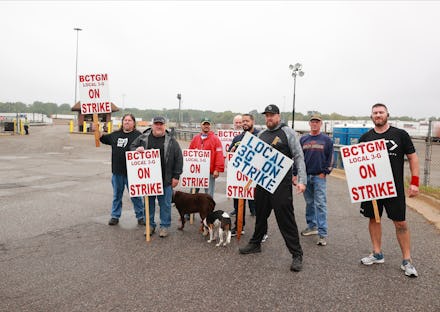Kellogg’s workers nationwide are walking out over grueling conditions
A proposed tiered payment system, 16-hour days, and no time off are among the complaints from the cereal giant’s workers.

It’s striking season again! Last week, Kellogg’s workers went on strike across the United States after attempts to negotiate their pay and benefits failed. Their complaints echo those of workers who went on strike at another prominent company, Frito-Lay, in July. And with over 1,400 workers joining the picket lines in Battle Creek, Michigan; Lancaster, Pennsylvania; Memphis, Tennessee; and Omaha, Nebraska, the Kellogg strike is similarly no small thing.
As a maker of popular cereals like Corn Flakes and Rice Krispies, Kellogg’s has likely been in your cabinets at some point. It may even be now. But at the start of the coronavirus pandemic, issues at its factories began to heat up. According to a press release from the Bakery, Confectionery, Tobacco Workers and Grain Millers International Union, “For more than a year throughout the COVID-19 pandemic, Kellogg workers around the country have been working long, hard hours, day in and day out, to produce Kellogg ready-to-eat cereals for American families.”
“Kellogg’s response to these loyal, hardworking employees has been to demand these workers give up quality health care, retirement benefits, and holiday and vacation pay,” the press release continued. It went on to state the company has threatened to outsource jobs to Mexico if “workers do not accept outrageous proposals that take away protections that workers have had for decades.”
In an interview with NBC News, Daniel Osborn, president of the local union in Omaha, elaborated on some of the worker’s complaints. Specifically, he pointed to problems with a proposed two-tier wage system that Kellogg’s wants to use, which, if implemented, would create separation between employees. Those on lower tiers would make $11 or $12 less than their higher-tier peers, while also having higher insurance premiums and and less vacation time.
There are also reports of workers being horrifically overworked. Kerry Williams, a mechanic who has worked at the Lancaster factory for 18 years, told Vice’s Motherboard, “We’re working 12 to 16 hours a day to meet the increased demand in the cereal market.”
Williams, who is also the president of the local union in Lancaster, went on to add, “I’ve worked for two years with no weekends off other than vacation days. You miss out on a lot — family time, don’t get to see kids play sports, don’t get to see your spouse.”
But perhaps nothing captures the crux of the issue more than one union worker’s statement to More Perfect Union: “We feed all these families, but I can’t feed mine.”
As expected, Kellogg’s isn’t too happy about the strike. In a statement, spokesperson Kris Bahner told CNN Business that Kellogg’s was “disappointed by the union decision to strike.” adding that the company “provides compensation and benefits for our U.S. ... employees that are among the industry's best. Our offer includes increases to pay and benefits for our employees, while helping us meet the challenges of the changing cereal business."
Yet, union workers disagree. Kevin Bradshaw, vice president of the local union in Memphis, told the Memphis Flyer that the company “forced our hand to be on strike.” After the union contract expired in 2020, Bradshaw explains, it had a year to prepare a contract that the union would agree to — and failed to do so. And although Kellogg’s brags about its benefits, Bradshaw said, “We worked through the pandemic, we had over a third of our plant that was infected or affected in some way by COVID-19, and we still showed up to work seven days a week, 12, 16 hours a day.”
Kellogg’s proposed changes to its pay system are particularly frustrating for union workers after the company’s CEO, Steve Cahillane, earned over $11.6 million in 2020. While Kellogg’s is expected to see a dip in sales compared to last year’s lockdown levels, it’s not enough of a hit to justify trying to create separation between employees with a tier system — especially not when its executives are immune to these changes and worries over pay.
“I’d like to highlight executive level compensation, and the bonuses [executives] received during the pandemic,” Trevor Bidelman, a Kellogg’s worker in Battle Creek and president of his local union, told Motherboard. “All of that was made possible because we worked seven days a week, 16 hours a day. Now with their greed, they want to thank us by cutting our jobs and making our future workforce have less than what our current workforce does.”
While CNN Business reported that less than 5% of Kellogg’s workers worldwide are on strike, that doesn’t mean this strike is something that can be brushed aside. As it continues, others have taken up a boycott of Kellogg’s products in solidarity with the union workers. And once a company’s pockets start hurting, they’re usually a lot more willing to negotiate.